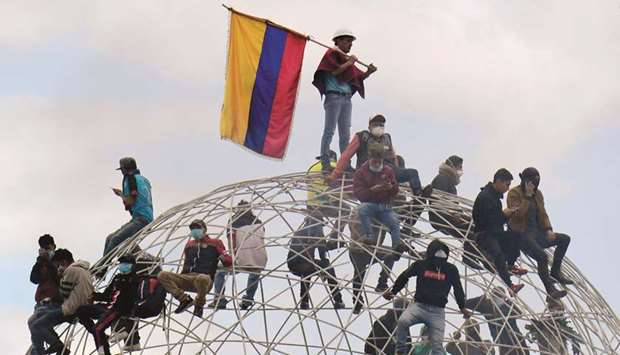An indigenous group in Ecuador that has led massive protests against a law that ended fuel subsidies said yesterday that it has accepted direct talks with President Lenin Moreno to discuss its repeal, the first sign of a breakthrough in a dispute that has triggered more than a week of sometimes violent unrest.
The announcement by Conaie, an umbrella organisation for indigenous groups across Ecuador, came as the capital of Quito was rocked by a 10th day of clashes over Moreno’s austerity plan, with the office of the country’s comptroller set on fire and access roads to Quito’s airport blocked.
Moreno said he ordered a curfew and the militarisation of Quito and surrounding valleys starting at 3pm (8pm GMT).
“This will facilitate the use of public force in the face of intolerable excess of violence,” Moreno said on Twitter.
One of Conaie’s leaders told local TV channel Ecuavisa that conditions for the talks included holding them in public and having them broadcast on media.
“We’re not going to talk behind closed doors. It has to be with the Ecuadorean people,” Leonidas Iza said in broadcast comments. “There has to be large screens so every tiny input from our members can be heard.”
The mayor of Quito, Jorge Yunda, told Ecuavisa that Moreno’s government had decided to “analyse” the decree Moreno passed last week that cut the longstanding fuel subsidies.
Moreno, 66, had previously refused to repeal the law, defending it as a key part of his efforts to rein in the fiscal deficit after signing a $4.2bn loan deal with the International Monetary Fund (IMF).
Moreno’s government did not immediately respond to requests for comment.
But it released a video on Twitter in which Moreno is heard describing a country that regains peace and prosperity.
Downtown Quito resembled a war zone as plumes of tear gas clouded streets littered with bricks.
Small fires burned and groups of people huddled behind walls and makeshift barricades for protection.
Local TV showed images of the office of the country’s comptroller enveloped in smoke.
The police said it had arrested 30 people at the multiple-storey building.
Five people have been killed in the unrest since it began on October 3, according to the office of the ombudsman, a state institution that monitors conflicts.
More than a 1,100 people have been arrested and nearly 1,000 wounded, it added.
Some oil wells have been closed by the protesters in parts of the country, curbing production of more than 1mn barrels of crude so far, the energy ministry said.
A Chinese-owned copper mine also announced on Saturday that it was limiting its operations as a precautionary measure.

Demonstrators sit atop the sculpture Esfera de Movimientos Oscilantes (Sphere of Oscillating Movements) at Quito’s El Arbolito park during the 10th day of a protest over a fuel price hike ordered by the government to secure an IMF loan, near the National Assembly.
